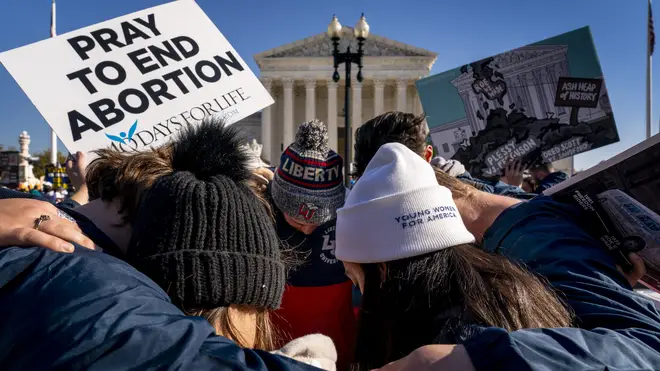
Ian Payne 4am - 7am
5 December 2021, 13:24

Up to 26 states would institute some sort of abortion-access restrictions within a year, if permitted by the Supreme Court, according to researchers.
A resurgent anti-abortion movement in the US is looking to press its advantage in state-by-state battles as the Supreme Court weighs the future of the landmark 1973 Roe v Wade decision.
Both anti-abortion campaigners and abortion rights supporters seem to be operating on the assumption that a court reshaped by former president Donald Trump will either overturn or seriously weaken Roe.
“We have a storm to weather,” said Elizabeth Nash, state policy analyst for the Guttmacher Institute, a research organisation that supports abortion rights.
“We have to weather the storm so that in the future – five, 10, 15 years from now – we’re talking about how we managed to repeal all these abortion bans.”

The institute estimates that as many as 26 states would institute some sort of abortion-access restrictions within a year, if permitted by the court.
At least 12 states have “trigger bans” on the books, with restrictions that would kick in automatically if the justices overturn or weaken federal protections on abortion access.
The current case before the court, Dobbs v Jackson Women’s Health Organisation, concerns a Mississippi law that bans abortion after 15 weeks of pregnancy.
Roe v Wade, which was reaffirmed in a subsequent 1992 ruling in Planned Parenthood v Casey, allows states to regulate but not ban abortion up until the point of foetal viability, at roughly 24 weeks.
The fate of the Mississippi case will not be known for months, but based on opening arguments, Roe appears to be in peril.
All six of the court’s conservative justices, including Trump appointees Neil Gorsuch, Brett Kavanaugh and Amy Coney Barrett, have indicated they would uphold the Mississippi law.

“There’s no doubt that what we heard from the Supreme Court was incredibly disturbing,” said Ianthe Metzger, director of state media campaigns for the Planned Parenthood Action Fund, one of the most prominent advocates of abortion access rights.
“It wasn’t really surprising but it was alarming.”
Susan Arnall, director of outreach for the anti-abortion Right to Life League, said she was particularly encouraged by Justice Samuel Alito’s emphasis on the concept of “viability” for the foetus as a guiding principle on when to ban the termination of a pregnancy.
She predicts that modern advancements in medicine will continue to shrink the window in which a foetus is not viable, opening the door to a host of medically intricate state-level debates.
“Viability is something that is subject to medical science,” Ms Arnall said. “It’s going to get intensely legal and intensely medical. It’s going to be a battle of lawyers and doctors.”
While Washington is the primary current battleground, many leaders of the conservative movement are treating the judicial battle as won and Roe’s demise as an inevitability. The next battleground will be a shifting cat-and-mouse fight in state legislatures and in next year’s elections across the country.

“People are realising that seven months from now, we’ll probably be dealing with this on a state level,” Brian Burch, president of CatholicVote, said.
“This will become much more prominent in state electoral races, especially governor’s races.”
Legislatures in many Republican-led states are poised for action depending on the Supreme Court’s ruling.
On Wednesday, the 6th US Circuit Court of Appeals vacated previous rulings that had blocked a Tennessee law that included banning abortions once a foetal heartbeat is detected – about six weeks – and ordered a rehearing by the full court.
“The battle has been happening in the statehouses for decades and it’s going to intensify,” Ms Nash said.
The Supreme Court’s ruling is expected around June, almost guaranteeing that the issue will dominate next autumn’s congressional elections as well as state-level races from coast to coast.